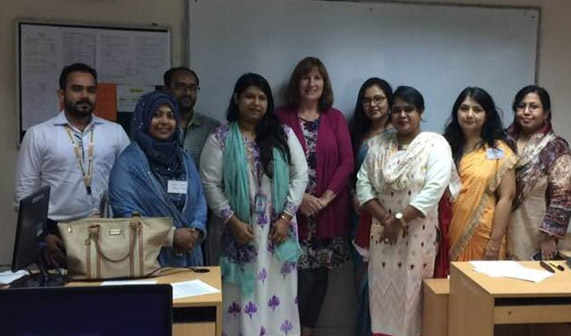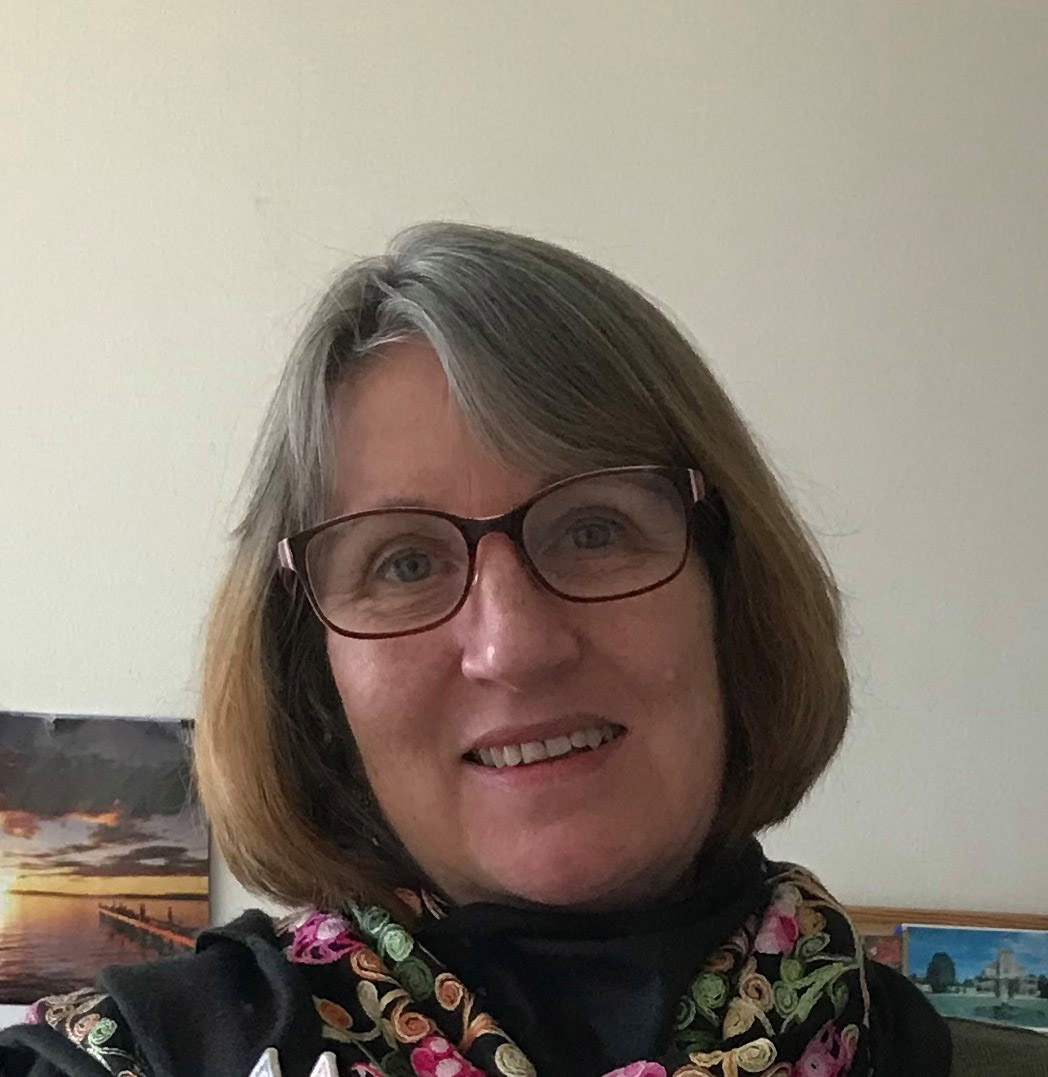Background Information
Background Information
The "Stories About Ourselves" project began with an idea to create culturally relevant English language graded reading materials that was generated through a presentation given by Ms. S. Akter and Ms. T. Begum, two Dhaka academics, at the Nepal English Language Teachers' Association (NELTA) conference in Kathmandu in 2017, and attended by Prof. Cherie Brown of Akita International University Japan, now the Project Manager.
This idea grew over time and was eventually followed up by a Bangladesh English Language Teachers' Association (BELTA) and 'Teachers Helping Teachers' (THT) training workshop with a small group of interested Bangladeshi English teachers in Dhaka in 2018.

Some of the members of the original 2018 writing workshop, BELTA/THT English Teacher Development Programme
Participants in the initial workshop formed into a materials' writing project team, and have continued to work together since then, with the welcome addition of new writers and project supporters, to create the materials you can find on this site.
The project team aims to collaborate in the creation and publication of graded stories and other reading texts in English, all with a Bangladeshi focus, and made available for free via the BELTA website. We are most grateful to the BELTA Executive Board for supporting and enabling this website to be created and maintained.
Each story is first written by one of the writing team members, then sent to the editor, who carefully grades it according to vocabulary frequency and grammatical complexity. High frequency GSL (General Service) word lists and the AWL (Academic Word List) have been used to ensure that learners meet the most common everyday English words, and the academic words they really need to know for success in higher study. For information about the New GSWL (New General Service Word List) high frequency word lists, please visit http://www.newgeneralservicelist.org. For a copy of the first 3000 words on the original GSL word list (created in 1953, but now out of print, by Michael West, who also had a strong connection with Bangladesh), go to https://www.wgtn.ac.nz/lals/resources/paul-nations-resources/vocabulary-lists/general-service-list/general-service-list-headwords.pdf). For information about the AWL, please visit. https://www.wgtn.ac.nz/lals/resources/academicwordlist
As well as being graded, the stories are carefully edited, and in some cases reshaped, to ensure the highest level of language accuracy and interest for readers.
The focus on creating stories with Bangladeshi content is a response to calls from Bangladeshi teachers of English for materials that are culturally familiar to learners, so that they do not have to struggle with unfamiliar foreign concepts at the same time as trying to learn the new target language, English.

View from the ferry, en route from Dhaka to Chandpur
In each reading text, the target vocabulary is highlighted in bold type, to help learners to notice the important words, and see how they are used in context. At the end of each reading passage you will find lists of these words. These are the crucial words that learners most need to focus on when learning English vocabulary. Learners are not expected to learn unusual words found in any of the texts (also called 'offlist' words), as these words are not so common in everyday English life. However, learners can, of course, use a dictionary to check word meanings of any word, if they wish. It is important that teachers encourage their learners to focus on the high frequency general and academic words first, before encouraging learners to study other offlist words.
The stories provided here are designed to be used in various ways. Firstly, the stories themselves may be used as extensive reading material, to build fluency, high frequency vocabulary knowledge, and a greater motivation to read in English. When reading extensively, the prime purpose is enjoyment, and to help learners to develop a habit of reading for reading sake, so it is important that learners read at a level that is appropriate for them. They should be instructed to choose material that is not too difficult. If a passage contains too many unknown words, readers are advised to drop a level. Likewise, if the passage is too easy, and almost all the words are known, learners should go up to the next level and try reading something there. The material provided here aims to eventually cover all learner levels.
Learners should always feel comfortable with the speed at which they tackle the reading texts, as well as the level of difficulty. When reading extensively, they should not labour for a long time over any of the reading texts, or have to stop repeatedly to unravel the details. The process should be smooth, relaxed and enjoyable.
On the other hand, teachers may also opt to use the material for intensive reading instruction if they wish. To this end, all stories and reading texts also have optional follow-up tasks and activities that will help teachers to plan interesting lessons that will require deeper exploration of story content and the English language. The follow-up activities, in most cases, include questions based loosely around the HOTS (Higher Order Thinking Skills) thinking levels as described in the cognitive domain of the new Bloom's Taxonomy: remembering, understanding, applying, analyzing, evaluating and creating. For more information about the use of Bloom's taxonomy in teaching, please visit https://tips.uark.edu/using-blooms-taxonomy

Beautiful tile work at the Star Mosque (Tara Masjid), Dhaka City
Please note: Teachers are asked to check the material carefully before use, to ensure that it is suitable for their learners. Some material on the site is designed for adult readers, and should not be given to young learners. The level of each text is indicated at the top of each reading text. Similarly, material that is designed for children and learners of a younger age may not be suitable for older learners. Teachers, therefore, need to exercise their professional discretion when selecting materials to use.
Over time, we hope that the bank of material provided here will grow, and become more and more widely used by teachers and learners of English in Bangladesh, and possibly beyond. Please help us to 'spread the word' by telling your colleagues and friends about this site and the materials here.
If you are an experienced English language teacher, with a love of writing, and wish to contribute stories for consideration, please click on this link. writing submission guidelines
There is no payment required when submitting your stories, nor is any payment made to writers on publication. If your story is accepted, you will need to provide your bio details and a photograph which will be published on our Writers' Profiles page.
Disclaimer: Though all stories are edited, at all times, writers are responsible for the content of their own stories. Ideas, information and opinions expressed therein are not necessarily those of the 'Stories About Ourselves' organization, the editor, THT, BELTA or any other group or individual.
Wishing you a happy and useful exploration of the site, and thanks for dropping by.
Prof. Cherie Brown - now retired, but formerly of Akita International University, Japan. ('Stories About Ourselves' Project Manager, Writing Team Leader and Editor, THT member, and presenter of BELTA/THT Teacher Development Workshops.)

* BELTA homepage https://www.belta-bd.org/
* Teachers Helping Teachers (THT) is a Special Interest Group (SIG) within the 'Japan Association for Language Teaching' (JALT). THT homepage, http://tht-japan.org/
For more background information about Michael West and his work in Bangladesh, please go to https://books.google.co.jp/books?id=RIaeh-xeCzEC&pg=PR22&lpg=PR22&dq=michael+west+bangladesh&source=bl&ots=7swEy0Qef9&sig=ACfU3U1K-19EKrgVDxkLA5MdLJdDM1G-kQ&hl=en&sa=X&ved=2ahUKEwjCu5WMtIPrAhXDF4gKHT7QBjsQ6AEwA3oECAoQAQ#v=onepage&q=michael%20west%20bangladesh&f=false